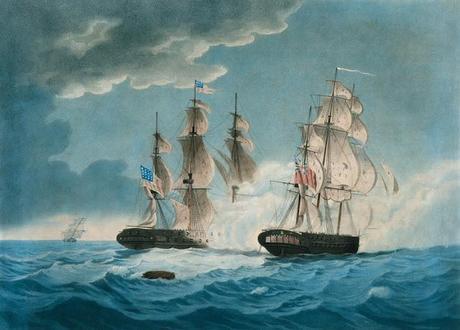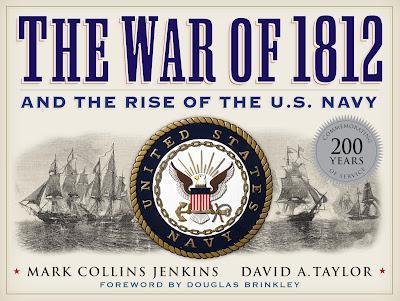
This print by T. Buttersworth depicts the January 1815 battle between President and Endymion that led to the capture of Commodore John Rodgers’ cherished frigate. Courtesy, U.S. Navy Art Collection. (p. 194)
Our generation’s images of the military have been dominated by the land wars in Iraq and Afghanistan, so many Americans have lost sight of the Navy. Act of Valor, the Hollywood film in theatres this month, reminds us of the Navy with the story of a SEALs Special Operations team like the one that caught and killed Osama bin Laden.
Two centuries ago and for much of early U.S. history, reminders were unnecessary. Americans grew up on the water, made their fortunes and risked their lives there. That was where our opportunities and risks lay. Nobody from that time speaks to ours more vividly than Joshua Penny, a sailor-turned-spy: Special Ops, 1812 style.
Penny’s saga dumbfounded me when I stumbled on it while researching The War of 1812 and the Rise of the U.S. Navy. He sought his fortune at sea as a boy, got kidnapped by the British, fought his way back home, and ultimately served as a spy against his old nemesis, the British Navy. For that service he did time as a prisoner of war, and came out unbowed.

Penny suffered most brutally from a prominent cause of the war: the British Navy’s practice of kidnapping U.S. seamen and pressing them into the imperial navy. The British stopped hundreds of American ships and in the decade before 1812 “press-ganged” roughly 10,000 American seamen, claiming they were British deserters. Even sailors holding papers proving their American citizenship weren’t safe. “I had frequently seen the papers of neutrals torn in pieces by the press gang, and thrown in the fire,” Penny reported. The U.S. went to war with “Free Trade and Sailors’ Rights” flying on banners from American sails.
Penny fell into the hands of press gangs and was held by the British navy for years. His first mission, as
he saw it, was to escape. He called British warships “nefarious floating dungeons.” After being shanghaied the first time by British conscription officers as a teenage sailor onshore in Ireland, he managed to escape -- only to be snared again. He was forced onto a 28-gun frigate along with three other Americans, several Danes and Swedes. He tried another escape, and was captured and flogged as a lesson to the others. He deserted once more and spent 14 months hiding in the caves of South Africa’s Table Mountain, surviving on honey and meat.Finally back in Long Island, he resumed life and built a business with his small boat, with a bitter eye trained on finding “the first opportunity of doing mischief to those who had so long tortured me.” When the War of 1812 came, he had his chance.
By the summer of 1813, Penny was on his next mission: to infiltrate and sabotage the British blockade that stopped all sea traffic up the coast. He got aboard the British ship Ramillies posing as a local vendor of produce and clams. The ship’s officers later realized he was “of course a spy to collect information on our movements,” and that he was preparing a torpedo “to destroy this ship.” They tracked him to his home and ambushed him at dawn. After firing at him, they seized him and hustled him, still in his pajamas, under guard to the Ramillies. There he was locked in irons on the bare deck all day in the August heat. For 18 days he survived on bread and water until the ship reached Halifax, where he was jailed as a prisoner of war.
In a few weeks, the story of his harsh treatment outraged the highest levels of the U.S. government. President Madison ordered retaliation. It took nine months before Penny was released and made his way home again, with the war in its final months. He had just one regret.
“It was never my good fortune to command a torpedo,” he recalled, “but I should be pleased to have the privilege of terrifying John Bull…” An attitude worthy of Act of Valor.
David Taylor, in addition is author of The War of 1812 and the Rise of the U.S. Navy and also Soul of a People: The WPA Writers' Project Uncovers Depression America. Visit him at his Amazon page.

